Plyushkins: you can't throw them away when you collect them (10 photos)
Surely you know such people, or even live next door to them - most often they are elderly people who not only do not throw anything away, but also drag into their apartment everything they find in the nearest garbage dumps. In their apartments, narrow paths are usually trodden among all the things, and something like an old bicycle or a pile of Soviet magazines may fall on their heads. 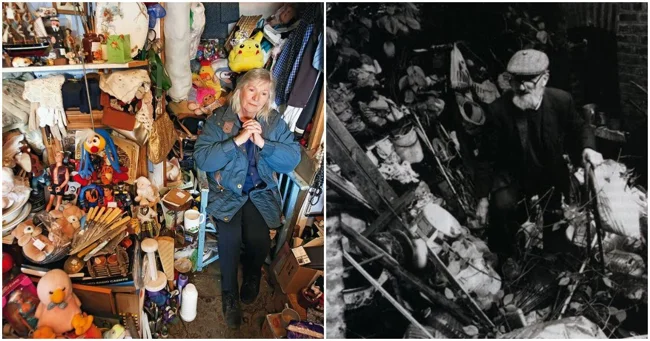
A good example is also Edmund Trebus, whose story became known in 1997. A worried woman called the police and said that she had not seen the old man living next door for several days. The police came to the call and saw a simply terrible picture: there was literally not a single free space in the house. The rooms were littered with scraps, garbage bags, boxes, torn clothes and who knows what else. Rats were walking around the house, and the smell was such that it was impossible to stay in the room for a long time. The stunned cops tried to call Trebus and somewhere from under the rubble they heard the barely audible groans of a 78-year-old man. 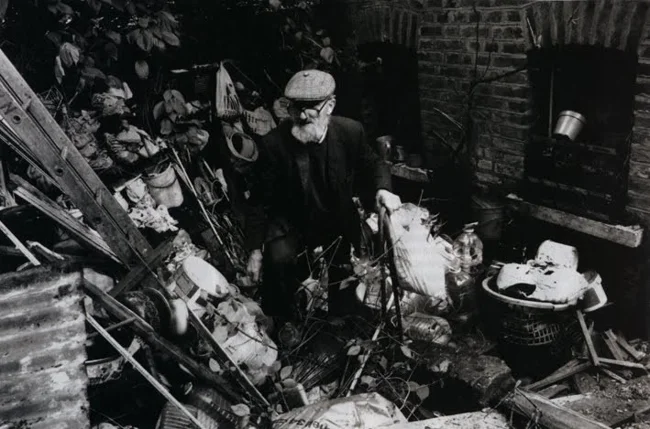
"Plyushkin syndrome" or pathological hoarding
This is an official psychiatric disease. People simply cannot stop and collect anything, including garbage. ICD-11 and DSM-5 classify it as obsessive-compulsive disorder.
To understand that a person has such a syndrome, you should pay attention to the following factors:
exclusion from family and anyone in general;
big problems with self-organization;
severe stress if you try to throw away a person’s things or even talk about it;
distrust of those who ask about the fate of things or try to touch them;
lack of understanding where to place them in the home;
a calm attitude towards living in a room that is absolutely uninhabitable due to mountains of rubbish. 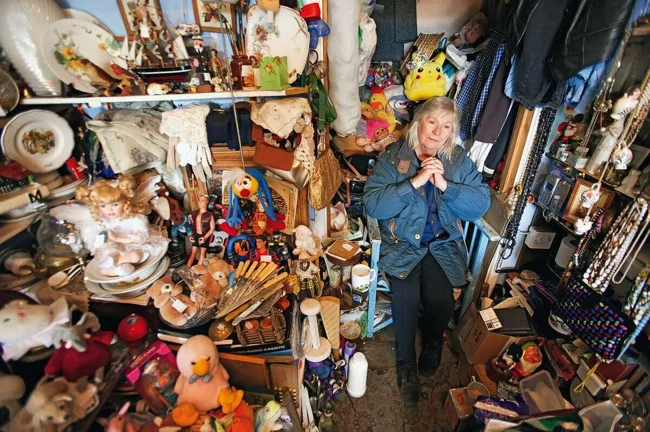
From 2% to 6% of the planet's population suffers from "Plyushkinism". The disease first begins to manifest itself at the age of 15-19, but by the onset of old age it rapidly gains momentum. Statistics show that people over 55 are more susceptible to increased hoarding syndrome. Usually, age-related mental problems - dementia - are also associated with the syndrome. People with ADHD, depression and schizophrenia are also at risk.
If we go back to Edmund Trebus, there were a huge number of factors that could have served as leverage. He said about himself: “I have cried all my life and I can do it endlessly.” His life was truly filled with tragic events. 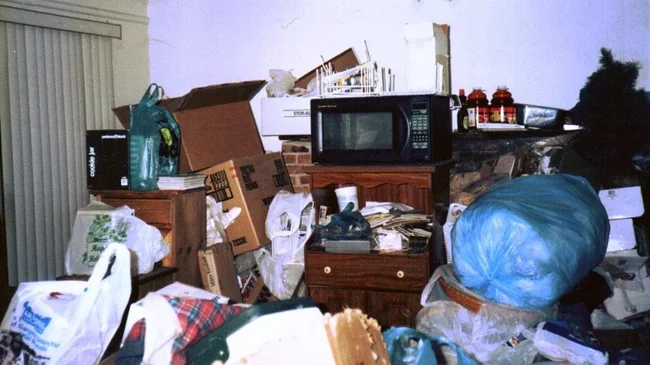
One of the rooms in Trebus's house
Trebus was born in Poland in 1918. He was three years old when his father, in an attempt to save a drowning fisherman, dived into the cold November water. Three days later, the man died, and the large family lost their breadwinner.
In 1939, Edmund was 20 years old when German troops entered Poland. The soldiers came to Trebus's house and when he refused to speak to them in German, they first beat the guy, then put him in prison, where they tortured him. Afterwards he was forcibly sent to the front.
At the end of the war, Trebus, under the program of resettlement of Poles, ended up in London, where he married a girl who bore him five children. In the 60s, the family bought a four-story house and Trebus’s life finally returned to normal... If not for the disease, which began to gain momentum during this period. 
Why is pathological hoarding dangerous?
"Plyushkin's" brain has abnormalities in the medial prefrontal cortex. Hoarding occurs regardless of the type or functionality of things, and is formed absolutely chaotically, even without minimal sorting. What comes out of this:
high risk of falls and injuries due to rooms overcrowded with things;
unsanitary conditions that seriously threaten health;
loneliness and isolation from society;
there is a big prospect of eviction and lawsuits with neighbors. 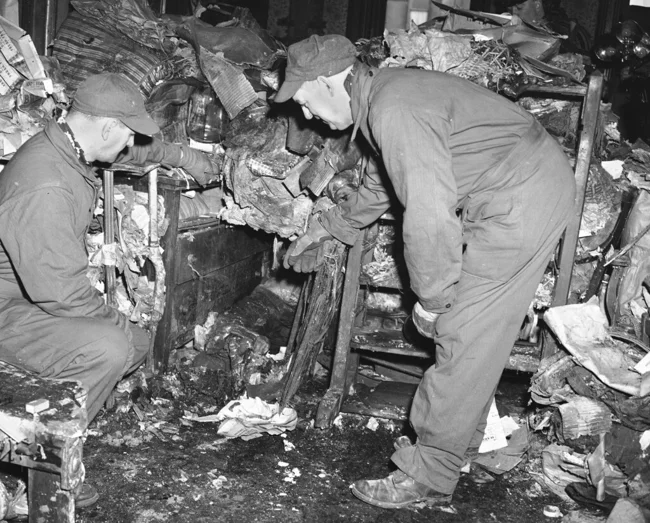
Trebus was just a little eccentric at first, a weirdo. He filled the rooms located on the top floor of the house from floor to ceiling with his finds: vacuum cleaners, video cameras, records and posters of Elvis Presley. Moreover, there is a separate room for each type of object found in trash bins or purchased from junk dealers.
The children grew up and moved out from their parents, and Edmund began to fill their rooms. Now the collections simply settled layer by layer, and the man went out every night to search, taking with him a cart for mining. Equipment, motorcycles, firewood, building materials, bicycles...
A neighbor who lived next to the Trebuses in the 60s said that for a long time she saw how the family’s garden gradually began to fill with things. For a long time, only a small island with a sun lounger remained free, where Edmund’s wife periodically lay, surrounded by mountains of garbage. As soon as she left her family, the corner was immediately occupied by new finds. 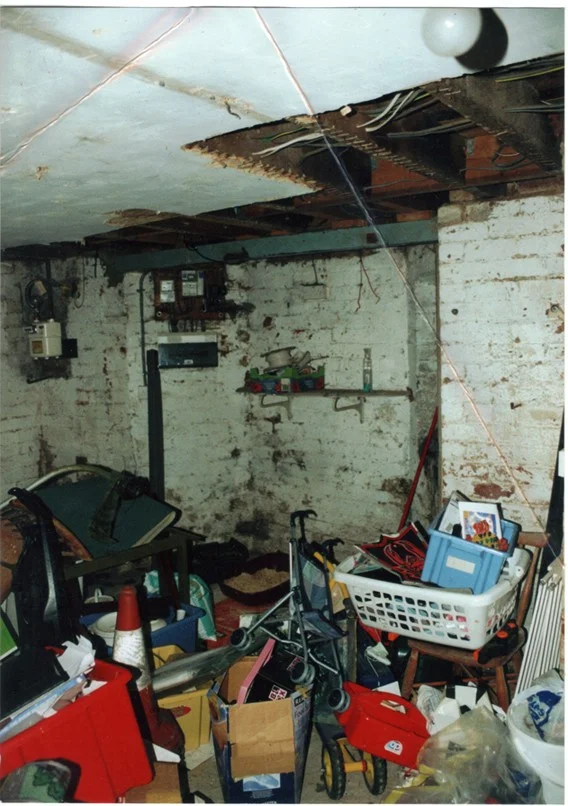
Trebus was left alone. Which, of course, only made his condition worse - there was so much rubbish in the garden that he needed a ladder to enter his own house. He had a sleeping place in the corner of the kitchen, because the bed was also littered with all sorts of rubbish. The plumbing and electricity stopped working in Edmund's house.
Of course, the neighbors have already tried more than once to reach out to some authorities, because one can only imagine what the smell was in Trebus’s house and yard. And rats. They scurried back and forth through the garden, feeling free in their garbage Eldorado.
For four days he lay in a heap of garbage, conscious of his life, and gangrene was actively developing on the man’s leg. The police, who arrived in 1997 following a call from a worried neighbor, saved him. And at the same time, the issue with the huge number of complaints from everyone who lived near the old man finally began to be resolved.
A series of lawsuits began. The city council was able to obtain permission to clean up the house and surrounding area. When a team of workers arrived at Trebus’s house, he was furious: he spat at the workers, swore, insulted them, and hit their legs with a stick. He shouted that they had no right to throw away his property according to the law, that they were the same Nazis who had taken everything from him. Trebus stated that he would fight and that his things were like his children. 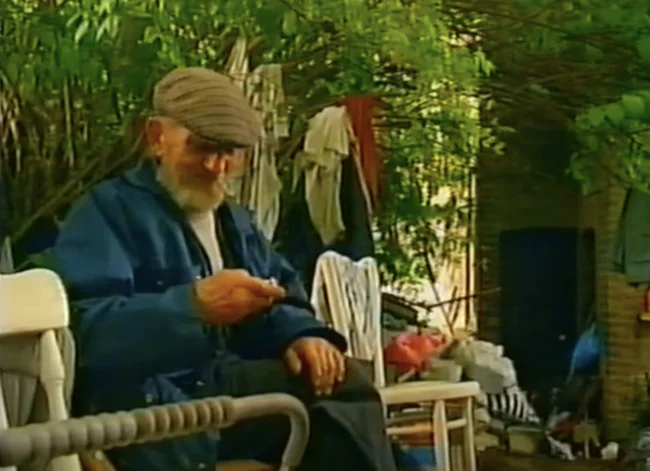
It took five trucks, six strong grown men and 30 days to pull out and take away 515 cubic yards of savings from the old man's house. The city council paid £30,000 for it.
Six months passed and Edmund's house was again filled to capacity with garbage. New courts, new attempts to clean up the house... Everything changed when one of the man’s sons intervened in the matter: he and the judge persuaded Edmund to go live in a nursing home. 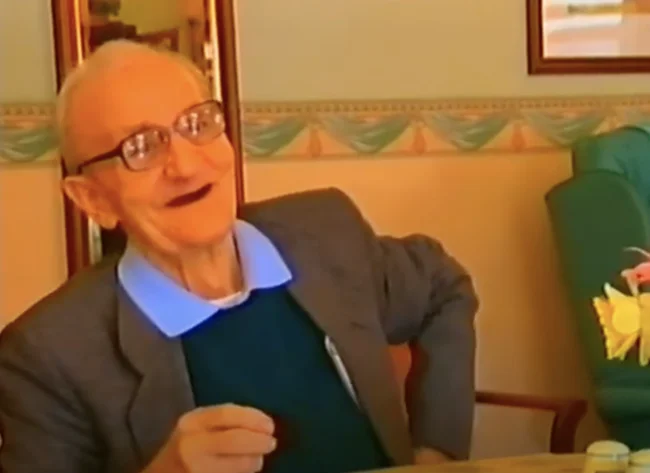
Smiling Trebus in a nursing home
Edmund Trebus was 83 years old when he received a neat, clean room, three good meals a day and the attentive care of a nurse.
After moving to a nursing home, Trebus wandered around the large territory of the boarding house and picked up everything that his gaze fell on - napkins, forks, cans. He stored it all under his own bed, and when the employees of the establishment found his supplies, they behaved gently and patiently with the old man. No one scolded him, and over time, Trebus realized that he had enemies in his new home and that they only wanted to help him. Once, talking with his nurse, he even admitted that he sincerely did not understand why he was collecting all this; the man understood that he was sick with something. This was the first step. Admit your illness. As you know, it is impossible to cure an alcoholic or drug addict until he himself wants it. The system here is approximately the same and you need to be very patient with the “pluskins” so that they are cured.
By the time Trebus ended up in a nursing home in the early 2000s, hoarding disorder had not yet been studied enough for him to receive proper treatment. But even that support and help from the staff of the boarding house had already done a lot - he was happy, clean and well-groomed. When journalists came to interview him, he honestly said that he was happy and the last time he felt so happy was when he proposed to his future wife.
In 2002, Edmund Trebus died quietly in his own bed, surrounded by caring people who did not blame him for anything. 
Today, there are several treatment options for people with hoarding disorder. Basically these are the following methods:
drug therapy, if there are a number of related problems (and this is usually the case) - taking mild antidepressants;
cognitive behavioral therapy, where the patient and the doctor together examine the causes of uncontrolled collecting, and then the patient begins to gradually change habits;
support groups. This is somewhat similar to Alcoholics Anonymous meetings, only here, in the company of other “Plyushkins,” people share their failures and successes. In case of a breakdown, no one in the group will judge the person and will provide him with support.
